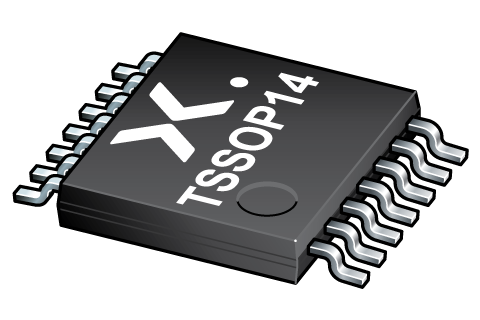可订购部件
| 型号 | 可订购的器件编号 | 订购代码(12NC) | 封装 | 从经销商处购买 |
|---|---|---|---|---|
| 74LVT125PW | 74LVT125PW,118 | 935197940118 | SOT402-1 | 订单产品 |

Register once, drag and drop ECAD models into your CAD tool and speed up your design.
Click here for more information3.3 V quad buffer; 3-state
The 74LVT125; 74LVTH125 is a quad buffer/line driver with 3-state outputs controlled by the output enable inputs (nOE). A HIGH on nOE causes the outputs to assume a high impedance OFF-state. Bus hold data inputs eliminate the need for external pull-up resistors to define unused inputs. This device is fully specified for partial power down applications using IOFF. The IOFF circuitry disables the output, preventing the potentially damaging backflow current through the device when it is powered down.
Quad bus interface
3-state buffers
Wide supply voltage range from 2.7 to 3.6 V
BiCMOS high speed and output drive
Output capability: +64 mA and -32 mA
Direct interface with TTL levels
Overvoltage tolerant inputs to 5.5 V
Bus hold data inputs eliminate need for external pull-up resistors to hold unused inputs
Live insertion and extraction permitted
No bus current loading when output is tied to 5 V bus
Power-up 3-state
IOFF circuitry provides partial Power-down mode operation
Latch-up performance exceeds 500 mA per JESD 78 Class II Level B
Complies with JEDEC standard JESD8C (2.7 V to 3.6 V)
ESD protection:
HBM: ANSI/ESDA/JEDEC JS-001 class 2 exceeds 2000 V
CDM: ANSI/ESDA/JEDEC JS-002 class C3 exceeds 1000 V
Specified from -40 °C to 85 °C
| 型号 | VCC (V) | Logic switching levels | Output drive capability (mA) | fmax (MHz) | Nr of bits | Power dissipation considerations | Tamb (°C) | Rth(j-a) (K/W) | Rth(j-c) (K/W) | Package name |
|---|---|---|---|---|---|---|---|---|---|---|
| 74LVT125PW | 2.7 - 3.6 | TTL | -32 / +64 | 150 | 4 | medium | -40~85 | 139 | 65 | TSSOP14 |
| Model Name | 描述 |
|---|---|
|
|
| 型号 | 可订购的器件编号,(订购码(12NC)) | 状态 | 标示 | 封装 | 外形图 | 回流焊/波峰焊 | 包装 |
|---|---|---|---|---|---|---|---|
| 74LVT125PW | 74LVT125PW,118 (935197940118) |
Active | LVT125 LVT125 Standard Procedure Standard Procedure |

TSSOP14 (SOT402-1) |
SOT402-1 |
SSOP-TSSOP-VSO-WAVE
|
SOT402-1_118 |
下表中的所有产品型号均已停产 。
| 型号 | 可订购的器件编号,(订购码(12NC)) | 状态 | 标示 | 封装 | 外形图 | 回流焊/波峰焊 | 包装 |
|---|---|---|---|---|---|---|---|
| 74LVT125PW | 74LVT125PW,112 (935197940112) |
Withdrawn / End-of-life | LVT125 LVT125 Standard Procedure Standard Procedure |

TSSOP14 (SOT402-1) |
SOT402-1 |
SSOP-TSSOP-VSO-WAVE
|
暂无信息 |
| 型号 | 可订购的器件编号 | 化学成分 | RoHS | RHF指示符 |
|---|---|---|---|---|
| 74LVT125PW | 74LVT125PW,118 | 74LVT125PW |
|
|
下表中的所有产品型号均已停产 。
| 型号 | 可订购的器件编号 | 化学成分 | RoHS | RHF指示符 |
|---|---|---|---|---|
| 74LVT125PW | 74LVT125PW,112 | 74LVT125PW |
|
|
| 文件名称 | 标题 | 类型 | 日期 |
|---|---|---|---|
| 74LVT_LVTH125 | 3.3 V quad buffer; 3-state | Data sheet | 2024-05-30 |
| SOT402-1 | 3D model for products with SOT402-1 package | Design support | 2023-02-02 |
| lvt125 | lvt125 IBIS model | IBIS model | 2013-04-09 |
| Nexperia_package_poster | Nexperia package poster | Leaflet | 2020-05-15 |
| TSSOP14_SOT402-1_mk | plastic, thin shrink small outline package; 14 leads; 0.65 mm pitch; 5 mm x 4.4 mm x 1.1 mm body | Marcom graphics | 2017-01-28 |
| SOT402-1 | plastic, thin shrink small outline package; 14 leads; 0.65 mm pitch; 5 mm x 4.4 mm x 1.2 mm body | Package information | 2023-11-07 |
| SOT402-1_118 | TSSOP14; Reel pack for SMD, 13"; Q1/T1 product orientation | Packing information | 2025-01-16 |
| 74LVT125PW_Nexperia_Product_Reliability | 74LVT125PW Nexperia Product Reliability | Quality document | 2025-03-20 |
| lvt | lvt Spice model | SPICE model | 2013-05-07 |
| SSOP-TSSOP-VSO-WAVE | Footprint for wave soldering | Wave soldering | 2009-10-08 |
The Nexperia Longevity Program is aimed to provide our customers information from time to time about the expected time that our products can be ordered. The NLP is reviewed and updated regularly by our Executive Management Team. View our longevity program here.
| Model Name | 描述 |
|---|---|
|
|
| 型号 | Orderable part number | Ordering code (12NC) | 状态 | 包装 | Packing Quantity | 在线购买 |
|---|---|---|---|---|---|---|
| 74LVT125PW | 74LVT125PW,118 | 935197940118 | Active | SOT402-1_118 | 2,500 | 订单产品 |
作为 Nexperia 的客户,您可以通过我们的销售机构订购样品。
如果您没有 Nexperia 的直接账户,我们的全球和地区分销商网络可为您提供 Nexperia 样品支持。查看官方经销商列表。
The interactive datasheets are based on the Nexperia MOSFET precision electrothermal models. With our interactive datasheets you can simply specify your own conditions interactively. Start by changing the values of the conditions. You can do this by using the sliders in the condition fields. By dragging the sliders you will see how the MOSFET will perform at the new conditions set.